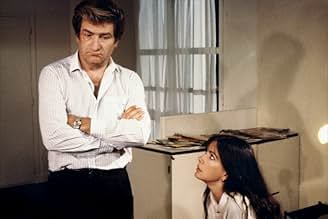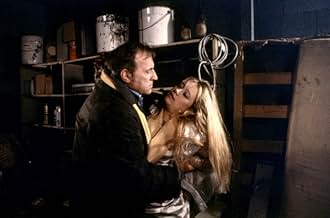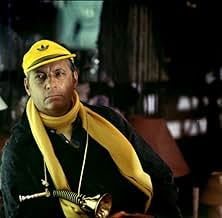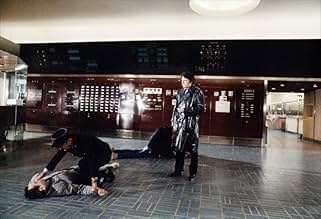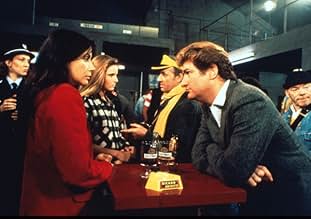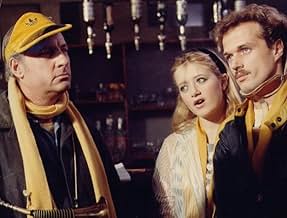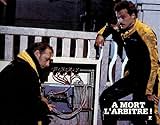Michel,a referee has to suffer the consequences of having whistled a penalty against a team which is supported by football hooligans.Michel,a referee has to suffer the consequences of having whistled a penalty against a team which is supported by football hooligans.Michel,a referee has to suffer the consequences of having whistled a penalty against a team which is supported by football hooligans.
- Awards
- 1 win & 1 nomination total
- Director
- Writers
- All cast & crew
- Production, box office & more at IMDbPro
Storyline
Did you know
- TriviaGéraldine Danon's debut,
Featured review
NOTE: This review should be read in conjunction with my review of "Coup de tête" (1978).
It is an oxymoron that the word "arbitrary" has the same roots as the word "arbitre". Something that is arbitrary defies the law, happens illogically. The "arbitre", on the other hand, is the referee, the one who imposes the law in the football field. And for this, he is often the victim of attacks by fanatics.
It is difficult to determine why one becomes a sport fanatic. Influence from friends, passion with the sport are some of the factors. Regardless, the fanatics' actions often result to the deaths of innocents, and blot the copybook of the sport. Jean-Pierre Mocky's work "À mort l'arbitre !" examines exactly this exaggerated behaviour of football fanatics and hooligans.
The film revolves around a referee, Michel (Eddy Mitchell) who attracts the wrath of some hooligans when he whistles a penalty for the team they support. Their leader, Rico (Michel Serrault) decides to punish the referee in the most despicable of ways: to kill him.
This is one of the few films in French cinema that have football as their topic. In the first part of my examination of the role of football in French cinema, I had written that football mostly serves as the occasion to examine deeper social issues, as exemplified in the movie "Coup de tête" (1978). Mocky's work, on the other hand, revolves completely around the sport, especially one of its most negative aspects, that of blind fanaticism.
The hooligans in the movie are clearly presented as the villains; they have no redeeming qualities, being either so cartoonish that they border on the comical, or so preposterous that no justification can be found for their actions. Rico's neurotic nature and deep hate for anyone who doesn't side with his team classify him on the second category.
Contrary to other films, that have tried to show the human side of the hooligans and the societal reasons because of which they engage in their often lethal actions, Mocky's film is a criticism of their bringing violence to a beloved sport. This is why he portrays them so hyperbolically. This way, every human quality is lost and all that remains is their villainous side.
While Mocky has been characterized the most anarchic of French directors, in this film he takes the side of the order as exemplified by the referee. Michel whistles the penalty because this is fair, and not due to any negative inclination towards Rico's team. The fact that the hooligans behave so irrationally to someone that is innocent reinforces Mocky's inclination to the referee, without which football would be a barbarous sport, without any of the rules that give it its relative civility and make it appropriate for a general audience.
In the film, the players don't play a single role. For, it is not them that cause the violence associated with the sport, but the hooligans. In most cases, when a death is caused by a hooligan attack, the players of all teams unite and send a message of piece. The hooligans, though, don't have such cooperative instincts. They do what they do for their individual team. The other teams and their supporters are viewed as enemies. And, when someone harms their team, they must pay, like poor Michel in the movie.
It s unfortunate that the film's plot also has truly disappointing elements. What at first is an examination of the behaviour of hooligans evolves into a thriller, that even has a car chase in the last sequence. Whilst the director's choice to show the personal life of the referee was maybe meant as an attempt at humanising him more, it serves more as a diversion from the film's real subject. The weak score, typical synth music of the time, has neither artistic merit nor hit potential and sounds bland and forgettable.
Mocky's film is a condemnation of violence in football, of the mentality that creates hooligans, that is unfortunately combined with a much overdramatic story. Still, it is commendable for its attempt at examining the sensitive topic of hooliganism in French football when the topic was largely absent from films.
It is an oxymoron that the word "arbitrary" has the same roots as the word "arbitre". Something that is arbitrary defies the law, happens illogically. The "arbitre", on the other hand, is the referee, the one who imposes the law in the football field. And for this, he is often the victim of attacks by fanatics.
It is difficult to determine why one becomes a sport fanatic. Influence from friends, passion with the sport are some of the factors. Regardless, the fanatics' actions often result to the deaths of innocents, and blot the copybook of the sport. Jean-Pierre Mocky's work "À mort l'arbitre !" examines exactly this exaggerated behaviour of football fanatics and hooligans.
The film revolves around a referee, Michel (Eddy Mitchell) who attracts the wrath of some hooligans when he whistles a penalty for the team they support. Their leader, Rico (Michel Serrault) decides to punish the referee in the most despicable of ways: to kill him.
This is one of the few films in French cinema that have football as their topic. In the first part of my examination of the role of football in French cinema, I had written that football mostly serves as the occasion to examine deeper social issues, as exemplified in the movie "Coup de tête" (1978). Mocky's work, on the other hand, revolves completely around the sport, especially one of its most negative aspects, that of blind fanaticism.
The hooligans in the movie are clearly presented as the villains; they have no redeeming qualities, being either so cartoonish that they border on the comical, or so preposterous that no justification can be found for their actions. Rico's neurotic nature and deep hate for anyone who doesn't side with his team classify him on the second category.
Contrary to other films, that have tried to show the human side of the hooligans and the societal reasons because of which they engage in their often lethal actions, Mocky's film is a criticism of their bringing violence to a beloved sport. This is why he portrays them so hyperbolically. This way, every human quality is lost and all that remains is their villainous side.
While Mocky has been characterized the most anarchic of French directors, in this film he takes the side of the order as exemplified by the referee. Michel whistles the penalty because this is fair, and not due to any negative inclination towards Rico's team. The fact that the hooligans behave so irrationally to someone that is innocent reinforces Mocky's inclination to the referee, without which football would be a barbarous sport, without any of the rules that give it its relative civility and make it appropriate for a general audience.
In the film, the players don't play a single role. For, it is not them that cause the violence associated with the sport, but the hooligans. In most cases, when a death is caused by a hooligan attack, the players of all teams unite and send a message of piece. The hooligans, though, don't have such cooperative instincts. They do what they do for their individual team. The other teams and their supporters are viewed as enemies. And, when someone harms their team, they must pay, like poor Michel in the movie.
It s unfortunate that the film's plot also has truly disappointing elements. What at first is an examination of the behaviour of hooligans evolves into a thriller, that even has a car chase in the last sequence. Whilst the director's choice to show the personal life of the referee was maybe meant as an attempt at humanising him more, it serves more as a diversion from the film's real subject. The weak score, typical synth music of the time, has neither artistic merit nor hit potential and sounds bland and forgettable.
Mocky's film is a condemnation of violence in football, of the mentality that creates hooligans, that is unfortunately combined with a much overdramatic story. Still, it is commendable for its attempt at examining the sensitive topic of hooliganism in French football when the topic was largely absent from films.
- eightylicious
- Apr 1, 2022
- Permalink
Details
- Release date
- Country of origin
- Language
- Also known as
- Tod eines Schiedsrichters
- Filming locations
- Créteil, Val-de-Marne, France(shopping mall)
- Production companies
- See more company credits at IMDbPro
- Runtime1 hour 22 minutes
- Sound mix
Contribute to this page
Suggest an edit or add missing content


